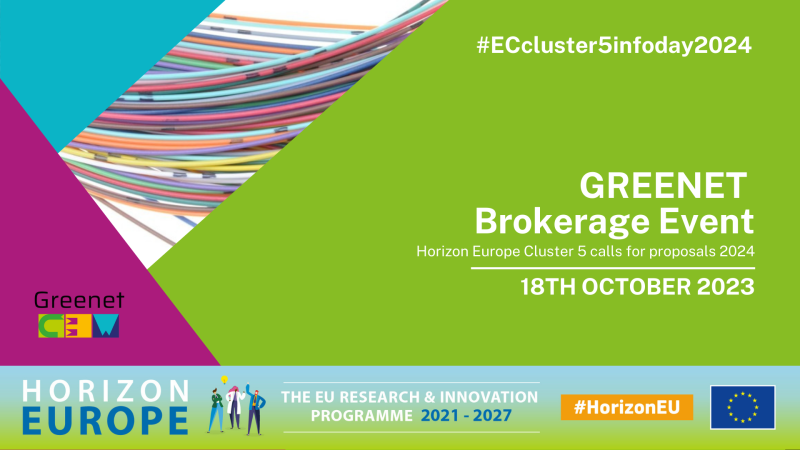Cluster 5 (Climate, Energy, Mobility) topics relevant for Cluster 6
NCPs covering two Clusters (Cluster 5 and Cluster 6) have compiled a list of open and forthcoming topics from Cluster 5 2024 Calls, that may be of interest to Cluster 6 applicants. The topics cover climate sciences and responses, other selected topics also include aspects of circularity and environmental considerations of batteries, renewable energy technologies, buildings, transport and more. Have a look at the topics here.
We remind you that the Greenet brokerage event is on the 18th of October, see here
Destination 1 – Climate sciences and responses for the transformation towards climate neutrality
Apply: 12.09.2023 – 05.03.2024
Earth system science
- HORIZON-CL5-2024-D1-01-01: Enhanced quantification and understanding of natural and anthropogenic methane emissions and sinks (RIA)
- HORIZON-CL5-2024-D1-01-02: Inland ice, including snow cover, glaciers, ice sheets and permafrost, and their interaction with climate change (RIA)
- HORIZON-CL5-2024-D1-01-03: Paleoclimate science for a better understanding of the short- to long-term evolution of the Earth system (RIA)
Climate change mitigation, pathways to climate neutrality
- HORIZON-CL5-2024-D1-01-04: Improved toolbox for evaluating the climate and environmental impacts of trade policies (RIA)
- HORIZON-CL5-2024-D1-01-05: Next generation low-emission, climate-resilient pathways and NDCs for a future aligned with the Paris Agreement (RIA)
- HORIZON-CL5-2024-D1-01-06: The role of climate change foresight for primary and secondary raw materials supply (RIA)
Climate -ecosystem interactions
- HORIZON-CL5-2024-D1-01-07: Quantification of the role of key terrestrial ecosystems in the carbon cycle and related climate effects (RIA)
Destination 2 – Cross-sectoral solutions for the climate transition
Apply: 07.12.2023 – 18.04.2024
A competitive and sustainable European battery value chain
- HORIZON-CL5-2024-D2-01-01: Advanced sustainable and safe pre-processing technologies for End-of-Life (EoL) battery recycling (Batt4EU Partnership) (RIA)
Relevance for Cl 6: Contribute to circularity of battery materials, where also non-metallic elements (electrolyte, solvent, salts and polymers) are recycled back to use (as raw materials or valuable chemicals).
- HORIZON-CL5-2024-D2-01-03: Development of technical and business solutions to optimise the circularity, resilience, and sustainability of the European battery value chain (Batt4EU Partnership) (RIA)
Relevance for Cl 6: Development of sustainable business methods for technical, economic, and environmental evaluation of cycle life options: retrofit, second life, and recycling. Innovations in battery design and architecture at all levels (system, pack, cell) supporting dismantling and recycling at the end of life.
- HORIZON-CL5-2024-D2-01-04: Emerging energy technologies for a climate neutral Europe (RIA)
Relevance for Cl 6: In developing its concept, the proposal should address low environmental impact (e.g., on climate change and pollution) quantified based on Life Cycle Assessment (LCA) framework.
Destination 3 – Sustainable, secure and competitive energy supply
Apply: 12.09.2023 – 16.01.2024
Global leadership in renewable energy
- HORIZON-CL5-2024-D3-01-03: Demonstration of improved intermediate renewable energy carrier technologies for transport fuels (IA)
Relevance for Cl 6: Examples are demonstration of production of bio-oils, raw alcohols, bio-liquids, biogas, syngas and thermally pre-treated solid biomass fuels from biogenic residues and wastes and microalgae oils.
- HORIZON-CL5-2024-D3-01-04: Improvement of light harvesting and carbon fixation with synthetic biology and/or bio-inspired//biomimetic pathways for renewable direct solar fuels production (RIA)
Relevance for Cl 6: Development of novel in-vivo or in-vitro biochemical and/or bio-inspired/biomimetic pathways for solar fuel production with increased efficiency in comparison to light and dark reactions of natural photosynthesis by synthetic biological and/or bio-inspired/biomimetic approaches. Take into account environmental sustainability including circular economy.
- HORIZON-CL5-2024-D3-01-05: Development of carbon fixation technologies for biogenic flue gases (RIA)
Relevance for Cl 6: Development of biological and chemical solutions to use the effluent gases from bioenergy combustion systems.
- HORIZON-CL5-2024-D3-01-06: Innovative applications/integration of geothermal heating and cooling in industry (RIA)
Relevance for Cl 6: Activities related to geothermal heat for industry and agriculture can be considered. It must be ensured that negative impacts on ecosystems and biodiversity, including negative impacts on (or pollution affecting) air, water or soil quality, are addressed through mitigation policies.
- HORIZON-CL5-2024-D3-01-08: Demonstration of sustainable wave energy farms (IA)
Relevance for Cl 6: Projects are requested to demonstrate the technologies at sea while respecting existing environmental regulatory framework. Necessary mitigation measures should be integrated to protect habitats and species. Present an environmental monitoring plan to be implemented during the demonstration action.
- HORIZON-CL5-2024-D3-01-10: Next generation of renewable energy technologies (RIA)
Relevance for Cl 6: In developing its concept, the proposal is expected to address the following related aspects: lower environmental impact, minimising the impacts on biodiversity and protected species and habitats.
Apply: 17.09.2024 – 21.01.2025
Global leadership in renewable energy
- HORIZON-CL5-2024-D3-02-03: Development of smart concepts of integrated energy driven bio-refineries for co-production of advanced biofuels, bio-chemicals and biomaterials (RIA)
Relevance for Cl 6: Development of zero-waste and neutral or negative carbon emission energy-efficient biorefinery concepts for enabling the production of low-cost advanced biofuels through co-production of added value bio-based products and bioenergy. Assess the feedstock cost supply and mobilization patterns.
- HORIZON-CL5-2024-D3-02-04: Critical technologies for the future ocean energy farms (RIA)
Relevance for Cl 6: The innovative technologies should not significantly harm the environment (DNSH principle) and have low impact on ecosystem biodiversity and consider potential mitigation measures.
- HORIZON-CL5-2024-D3-02-07: Resource Efficiency of PV in Production, Use and Disposal (CSA)
Relevance for Cl 6: Contribute to reducing the environmental footprint associated to PV technology deployment across all the phases of the system lifetime (production, transport, installation and end of life). Define design and processing guidelines to optimally address circularity of PV systems.
- HORIZON-CL5-2024-D3-02-08: Minimisation of environmental, and optimisation of socio-economic impacts in the deployment, operation and decommissioning of offshore wind farms (RIA)
Relevance for Cl 6: Develop design tools for the planning of wind farms to minimize the overall life-cycle environmental impacts (noise, impact on seabed, visual effect, effects on marine life and other species). Or, develop solutions to reduce the environmental impact of installation, construction and decommissioning.
- HORIZON-CL5-2024-D3-02-09: Demonstrations of innovative floating wind concepts (IA)
Relevance for Cl 6: Projects are requested to demonstrate the technologies at sea while respecting existing environmental regulatory framework. Present an environmental monitoring plan to be implemented during the demonstration action. Proposals are expected to address also circularity of (critical) raw materials.
- HORIZON-CL5-2024-D3-02-10: Market Uptake Measures of renewable energy systems (CSA)
Relevance for Cl 6: Issues related to acceptability of RES technologies due to ecologic, economic and social aspects are expected to be addressed.
Carbon Capture, Utilization and Storage (CCUS)
- HORIZON-CL5-2024-D3-02-12: DACCS and BECCS for CO2 removal/negative emissions (IA)
Relevance for Cl 6: Further the technological development of direct air carbon capture and storage (DACCS) and bioenergy carbon capture and storage (BECCS) and address the environmental, social and economic challenges and benefits. Address the sustainability of biomass.
Destination 4 – Efficient, sustainable and inclusive energy use
Apply: 07.12.2023 – 18.04.2024
Industry
- HORIZON-CL5-2024-D4-01-03: Alternative heating systems for efficient, flexible and electrified heat generation in industry (IA)
Relevance for Cl 6: Make an analysis of the potential industrial deployment and related benefits (technical, economic, climatic, environmental) of at least one alternative heat source technology in three industrial sectors.
Apply: 17.09.2024 – 21.01.2025
Highly energy-efficient and climate neutral European building stock
- HORIZON-CL5-2024-D4-02-02: Robotics and other automated solutions for construction, renovation and maintenance in a sustainable built environment (Built4People Partnership) (RIA)
Relevance for Cl 6: Develop robotic and automated design and construction techniques that increase energy efficiency and reduce greenhouse gas emissions from construction and renovation works on-site. Develop approaches that use digitally assisted design to improve resource efficiency and reduce waste.
- HORIZON-CL5-2024-D4-02-03: BIM-based processes and digital twins for facilitating and optimising circular energy renovation (Built4People Partnership) (IA)
Relevance for Cl 6: Develop and integrate solutions based on Building Information Modelling (BIM) and Digital Twins to track buildings materials and construction products, and supporting cost-effective deconstruction and reuse, recycling and recovery of building materials at end of life.
- HORIZON-CL5-2024-D4-02-04: Design for adaptability, re-use and deconstruction of buildings, in line with the principles of circular economy (Built4People Partnership) (RIA)
Relevance for Cl 6: Improve the ease of reuse of construction elements and products from existing buildings, also facilitating recycling when reuse is not possible. Develop building elements and products from long-lived bio-based materials and products. Minimise negative impacts of pollution and biodiversity loss from construction.
- HORIZON-CL5-2024-D4-02-05: Digital solutions to foster participative design, planning and management of buildings, neighbourhoods and urban districts (Built4People Partnership) (IA)
Relevance for Cl 6: Digital solutions to analyse to-be-renovated buildings and neighborhoods in terms of energy use and generation, life-cycle environmental impacts. Address aspects of climate-neutrality and climate-resilience.
Destination 5 – Clean and competitive solutions for all transport modes
Apply: 07.12.2023 – 18.04.2024
Aviation
- HORIZON-CL5-2024-D5-01-07: Accelerating climate neutral aviation, minimising non-CO2 emissions (RIA)
Relevance for Cl 6: Increase the scientific understanding related to the impact of aerosols on clouds as well as the contribution of aviation NOx emissions to climate change. Avoiding climate sensitive regions has a large potential in reducing climate impact at relatively low costs without causing significantly more CO2 emissions.
- HORIZON-CL5-2024-D5-01-09: Impact monitoring of EU Aviation R&I (RIA)
Relevance for Cl 6: Deliver a toolbox, including preliminary impact assessments, that will be the reference choice for the definition and assessment of environmental, climate and competitiveness policy options of future European aviation R&I and regulatory measures.
Waterborne transport
- HORIZON-CL5-2024-D5-01-13: Demonstration of Technologies to minimise underwater noise generated by waterborne transport (ZEWT Partnership) (IA)
Relevance for Cl 6: For example, take into account the H2020 project SATURN and the LIFE+ project PIAQUO to support the development of standards for the specification of noise levels. Increase the awareness of European ship owners of the environmental impact from underwater noise and the possibilities to reduce it.
Transport-related health and environment
- HORIZON-CL5-2024-D5-01-18: Assessment of air pollutant emissions from low-carbon fuels in the heavy-duty, aviation, and maritime sectors (RIA)
Relevance to Cl 6: The air pollutant emissions from combustion-based heavy-duty vehicles, aircraft and ships using alternative fuels, are measured and characterised according to real-life scenarios of use. Emerging pollutants resulting from the use of novel low-carbon fuels are identified and quantified.
Destination 6 – Safe, Resilient Transport and Smart Mobility services for passengers and goods
Apply: 07.05.2024 – 05.09.2024

